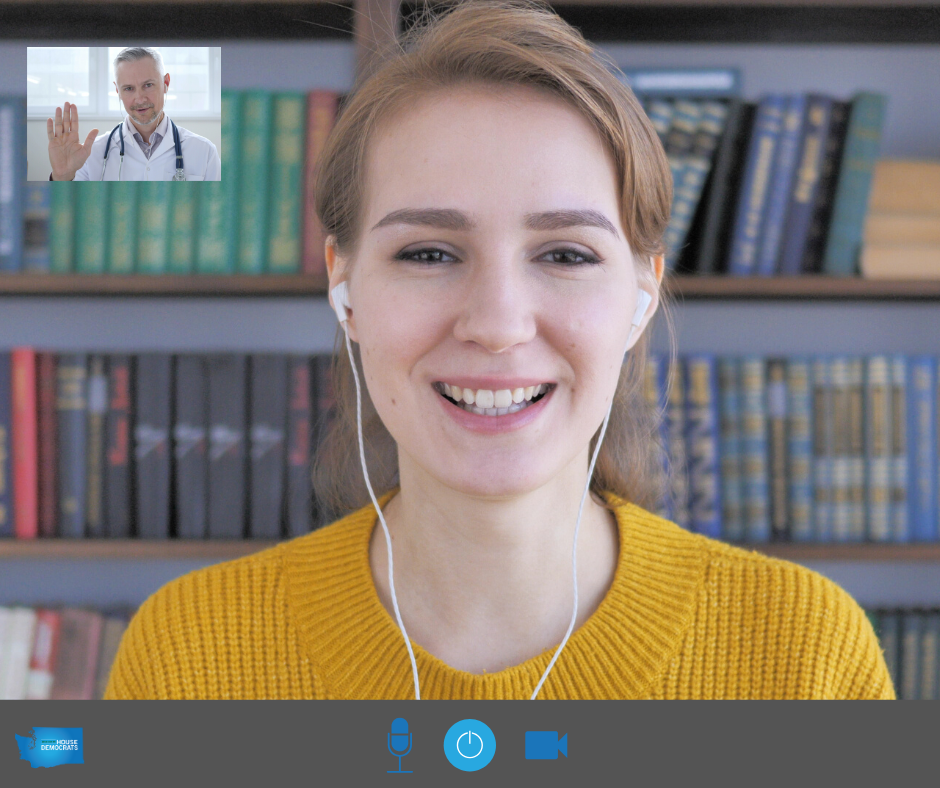Dear Friends and Neighbors,
These past few weeks have seen unprecedented social and economic disruption. The situation is very fluid and we learn more every day, but it is now clear that preventing this virus from overwhelming our hospital system will require everyone in our country working together. Today Governor Jay Inslee issued a Stay Home, Stay Healthy order. This order requires Washingtonians to stay at home unless they are pursuing an essential activity like shopping, going to the doctor, or working in an essential business. It will also ban all gatherings including weddings and funerals.
COVID-19, as it is also known, has been transmitting in our community and our nation for weeks already. Because many who get the disease are asymptomatic or suffer only mild cases, it is impossible to know for sure how many people currently have it.
This is a very serious disease and while it may not seem too dangerous for young and healthy people, it can be very deadly for people over 60 and those with compromised immune systems. The only way that we can fight this virus is to stay at home unless performing an essential activity like grocery shopping.
While this will not stop the spread of the virus entirely, it can slow the spread. We do not have enough hospital beds and respirators to treat everyone who will need them if we do not make a concerted effort to slow transmission. By slowing the rate of people getting infections, we give our hospitals more of a chance to treat the most severe cases. This is known as flattening the curve.
I know that these measures come at an immense price. These are difficult decisions with no certain outcome but they are based on the best possible information available to us at the moment. I promise to work hard to mitigate the economic damage that will undoubtedly result from these measures.
There is more pain ahead, both in terms of the damage the virus will cause and also economic damage. The best thing we can do is listen to the public health experts and avoid as much unnecessary human interaction as possible. If we come together as a society to stay apart, we can slow this virus down and save lives.
It is important to remember that grocery stores will stay open and there is not reason to overstock or hoard food and supplies. It everyone sticks to their normal buying habits we can ensure that we do not experience shortages of essentials like toilet paper, cleaning supplies, and food. I understand the impulse to stock up, but if we buy too much there won’t be enough essentials left for health care workers and seniors who also need to shop.
Thank you to all of the people on the frontlines of this epidemic: the doctors, nurses, first responders, and health care workers who valiantly care for the sick and vulnerable despite the immense risk. Our childcare workers, grocery and pharmacy workers, delivery drivers, restaurant workers, janitors, food bank volunteers, and transit and supply chain workers who continue to go about their work and make sure that we can eat and have access to the supplies that we need also deserve our immense gratitude and respect. They keep showing up for us, let’s do everything we can to stay home for them.
Below you will find some resources and tips for dealing with school closures, loss of employment, and health care. Stay Home, Stay Healthy. Remember to wash your hands!
Take care,

Shelley Kloba
State Representative
Support for parents and students during school closures
Schools are the cornerstones of our community. Last week, Governor Jay Inslee and Superintendent of Public Instruction Chris Reykdal directed all schools statewide to close until April 27 at the earliest. We know that school closures will have a serious impact on Washington’s families. Here are some resources for families affected by this disruption.
OSPI will continue to be your best resource for updated information. Check their website or follow them on Twitter and Facebook.
Parents of students who receive free or reduced-price school meals should contact their school district about meal distribution.
Here are additional resources to assist parents and students while schools remain closed:
- School closure FAQ
- Tips for talking to your children about school closures
- Questions and answers from the US Department of Education about providing services to children with disabilities
- Financial education resources from Financial Education Public Private Partnership (great for older students)
- Printable social studies lessons and activities for students from the Pulitzer Center
- Free virtual museum tours from London to Seoul
- Women’s History Month lessons and conversation kits for students of all ages
- Online Physical Education Network’s tools for creating an active home.
- List of online mathematics resources for remote learning
- World language learning from PBS and Georgia Virtual Learning
- Seattle Times article on child care and at-home learning during coronavirus closures
Social distancing, not social isolation
While social distancing practices are one of the best ways to slow down the spread of infectious diseases, like COVID-19, stress and lack of human interaction can have negative impacts on our behavioral health.
Here are some recommendations and resources to stay mentally healthy over the next few weeks.
Know the signs of stress, depression and anxiety, and how to manage those symptoms.
Take care of your physical health. Eat healthy, nutritious foods, and go for walks outside – just maintain the six-feet social distancing rules.
Practice social distancing, not social isolation. Use technology to stay virtually connected with loved ones.
If you’re working from home or your child’s school has been cancelled, create and stick to regular schedules and routines.
There is going to be constant media coverage on COVID-19. You can avoid overloading on COVID-19 negativity by only consuming information from reliable official resources and know it’s okay to disconnect from time to time.
Find things to do that relieve stress that don’t involve screen time, like reading books, picking up old creative hobbies or indoor physical activities, including regular stretching.
Reach out to a professional if you need help. You don’t have to go through it all alone.
Remember, this won’t last forever. These are temporary situations and will eventually end.
Support for Workers & Businesses
The Governor’s move to mandate a two-week closure of restaurants, bars, and entertainment and recreational facilities, as well as limiting gatherings to 50 people, will help slow down the spread of coronavirus. However, workers and business owners are being impacted and are looking for answers as they wonder how they will get their families through this necessary shutdown.
State agencies have adopted emergency rules and developed comprehensive websites to help relieve the burden of temporary layoffs, isolation and quarantine for workers and businesses. Please keep in mind that the content in the links below will likely be updated as this situation continues unfolding, so check these sites often for the latest information.
For Workers:
- The Employment Security Department has resources on paid sick leave, paid family and medical leave, unemployment benefits, and more. Check out this easy reference chart on scenarios and benefits.
- The Washington State Department of Financial Institutions has information available on mortgage payments, rent payments, student loan deferments, short term and emergency loans, utility payments, and more.
- The Office of the Insurance Commissioner has a site set up to help with insurance questions, including a frequently asked questions page.
- The Washington Health Benefit Exchange has opened a special enrollment period for individuals without insurance which will run through April 8th, 2020.
For Businesses:
- The Employment Security Department has information on what resources are available to help businesses keep employees, and information about tax filing lenience.
- Governor Inslee’s website has a list of resources on:
- How to apply for federal Small Business Administration loans.
- How to request tax filing extensions or penalty waivers from the Dept. of Revenue.
- Where to go for support from the Dept. of Commerce Export Assistance Team.
- The Office of the Insurance Commissioner has a page on business insurance information, including one answering questions on event cancellation insurance.
Addressing health care, insurance, long-term care needs during this crisis
During this unprecedented public health emergency, it is critical that important health care information is accessible for everyone. Many state agencies and health insurers are working to be responsive to the needs of Washingtonians.
Please use the resources below to help you make informed decisions about keeping you and your family healthy.
Health insurance
- Special open enrollment period through April 8
- Office of the Insurance Commissioner Coronavirus website
- Health insurance and coronavirus (COVID-19) frequently asked questions
- Kreidler calls on commercial labs to price fairly for coronavirus testing
- Kreidler orders Washington health insurers to waive deductibles, coinsurance and copays for coronavirus testing
- 2020-1 Emergency order to insurers on coronavirus (PDF, 251.14 KB)
- Coronavirus and health insurance (OIC blog)
- What health insurance plans must cover
- Medicare and coronavirus
- Health Care Authority Information about COVID-19
- Washington Apple Health (Medicaid) clients corona virus (COVID-19) FAQ
Public employee insurance and COVID-19
- Public Employees Benefits Board (PEBB) Program eligibility during the COVID-19 outbreak
- School Employees Benefits Board (SEBB) Program eligibility relating to school closures
Travel insurance
- Will travel insurance pay if you cancel a trip because of a health epidemic? (OIC blog)
- General information about travel insurance



